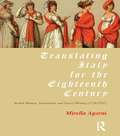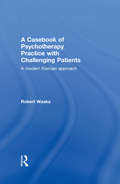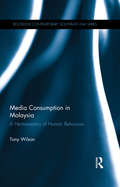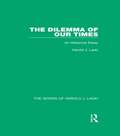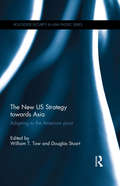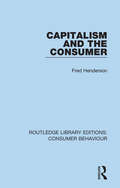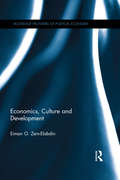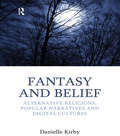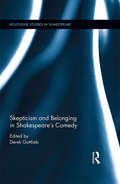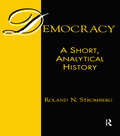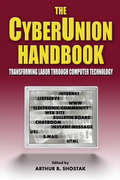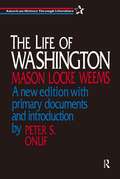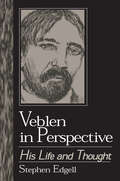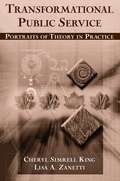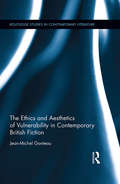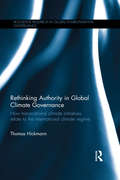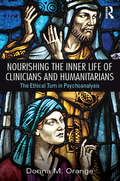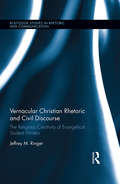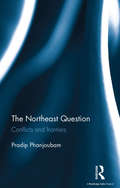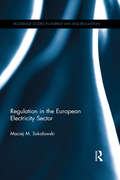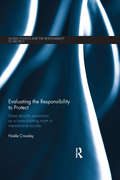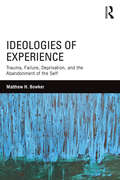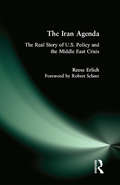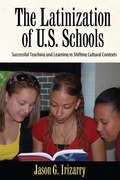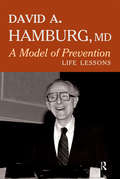Special Collections
Benetech’s Global Certified Accessible Titles
Description: Benetech’s GCA program is the first independent third-party EPUB certification to verify ebook accessibility. By creating content that is born accessible, publishers can meet the needs of all readers. Learn more: https://bornaccessible.benetech.org/
- Table View
- List View
Translating Italy for the Eighteenth Century
by Mirella AgorniTranslating Italy in the Eighteenth Century offers a historical analysis of the role played by translation in that complex redefinition of women's writing that was taking place in Britain in the second half of the eighteenth century. It investigates the ways in which women writers managed to appropriate images of Italy and adapt them to their own purposes in a period which covers the 'moral turn' in women's writing in the 1740s and foreshadows the Romantic interest in Italy at the end of the century. A brief survey of translations produced by women in the period 1730-1799 provides an overview of the genres favoured by women translators, such as the moral novel, sentimental play and a type of conduct literature of a distinctively 'proto-feminist' character. Elizabeth Carter's translation of Francesco Algarotti's II Newtonianesimo per le Dame (1739) is one of the best examples of the latter kind of texts. A close reading of the English translation indicates a 'proto-feminist' exploitation of the myth of Italian women's cultural prestige. Another genre increasingly accessible to women, namely travel writing, confirms this female interest in Italy. Female travellers who visited Italy in the second half of the century, such as Hester Piozzi, observed the state of women's education through the lenses provided by Carter. Piozzi's image of Italy, a paradoxical mixture of imagination and realistic observation, became a powerful symbolic source, which enabled the fictional image of a modern, relatively egalitarian British society to take shape.
A Casebook of Psychotherapy Practice with Challenging Patients
by Robert WaskaMost contemporary psychoanalysts and psychotherapists see each patient once or twice a week at most. As many patients have reached a marked state of distress before seeking treatment, this gives the analyst a difficult task to accomplish in what is a limited amount of time. A Casebook of Psychotherapy Practice with Challenging Patients: A modern Kleinian approach sets out a model for working with quite significantly disturbed, distressed, or resistant patients in a very limited time, which Robert Waska has termed "Modern Kleinian Therapy." Each chapter provides a vivid look into the moment-to-moment workings of a contemporary Kleinian focus on understanding projective identification, enactment, and acting out as well as the careful and thoughtful interpretive work necessary in these complex clinical situations. Individual psychotherapeutic work is represented throughout the book alongside instructive reports of psychoanalytic work with disturbed couples, and the more challenging patient is illustrated with several comprehensive reviews of films that follow such hard-to-reach individuals. A Casebook of Psychotherapy Practice with Challenging Patients: A modern Kleinian approach is filled with a combination of contemporary theory building, a wealth of clinical vignettes, and practical advice. It is a hands-on guide for psychoanalysts and therapists who need to get to grips with complex psychoanalytic concepts in a short time and shows the therapeutic power the Modern Kleinian Therapy approach can have and how it can enable them to work most effectively with difficult patients. Robert Waska LPCC, MFT, PhD is an analytic member at the San Francisco Center for Psychoanalysis and conducts a full-time private psychoanalytic practice for individuals and couples in San Francisco and Marin County, California. He is the author of thirteen published textbooks on Kleinian psychoanalytic theory and technique, is a contributing author for three psychology texts, and has published over a hundred articles in professional journals.
Media Consumption in Malaysia
by Tony WilsonHow do visitors immersing themselves in material places such as shopping malls or video sites online make sense of the experience, enabling criticizing - or consenting to content? How is this evident in behaviour? Reflecting on accounts by Chinese, Indian, Malay and Indigenous members of Malaysian society, this book addresses these questions from a practices perspective increasingly adopted by scholars in marketing and media studies. The volume provides an account of practices theory from its origins in critical hermeneutics (such as Heidegger, Gadamer and Ricoeur), as reflecting on the processes of embodied understanding, developing alongside interpretive and reception theory. Part I draws upon authors as diverse as Heidegger and Henry Jenkins, with a practices perspective on media and mall consuming shown as developing from forty years of theorizing about audience activity. An empirical study of Malaysian blogging and branding on YouTube exemplifies this approach. Part II considers Malaysians absorbed in social media sites, as everyday visitors and the subjects of consumer research. The book then returns to the material world, exploring the horizons of understanding from which Malaysians enter their mediated malls, and concludes by positioning media practices theory within a spectrum of philosophical ideas. Recognizing the current (re)turn in Consumer and Media Studies to employing hermeneutics as an account of our embodied human understanding, this book presents its major philosophical proponents, showing how close attention to their writing can now inform and shape research on ubiquitous screen users. As such, it will be of particular interest to students and scholars of Media Studies, Asian Studies and Marketing Studies.
The Dilemma of Our Times
by Harold J. LaskiThis book, originally published in 1952, unfinished and perhaps imperfect, is the last book of one of the most acute political thinkers of the twentieth century. Laski’s earlier optimism about a swing to the Left was beginning to be reversed, and in this volume he saw the defects of his previous optimistic surveys, which, in his opinion, still had value, but needed to be brought up-to-date and consquently he began to write an additional chapter which was never completed. It remains a valuable last word of an author who for thirty years was respected and listened to on the topic of civilisation’s survial through change.
The New US Strategy towards Asia
by Douglas Stuart and William T TowBarack Obama’s "rebalancing" or "pivot" strategy, intended to demonstrate continued US commitment to the Asia-Pacific region in a variety of military, economic, and diplomatic contexts, was launched with much fanfare in 2011. Implicit in the new strategy is both a focus on China – engagement with, and containment of – and a heavy reliance by the United States on its existing friends and allies in the region in order to implement its strategy. This book explores the impact of the new strategy on America’s regional friends and allies. It shows how these governments are working with Washington to advance and protect their distinct national interests, while at the same time avoiding any direct confrontation with China. It also addresses the reasons why many of these regional actors harbour concerns about the ability of the US to sustain the pivot strategy in the long run. Overall, the book illustrates the deep complexities of the United States’ exercise of power and influence in the region.
Capitalism and the Consumer
by Fred HendersonWritten at a time when the needs and influence of the consumer within the economic system were in their infancy, this book offers a valuable insight into the birth of consumer-led economics as an integral part of social structure and economic theory.
Economics, Culture and Development
by Eiman O. Zein-ElabdinThis book examines the treatment of culture and development in the discipline of economics, thereby filling a conspicuous gap in current literature. Economics has come a long way to join the ‘cultural turn’ that has swept the humanities and social sciences in the last half century. This volume identifies some of the issues that major philosophies of economics must address to better grasp the cultural complexity of contemporary economies. This book is an extensive survey of the place of culture and development in four theoretical economic perspectives—Neoclassical, Marxian, Institutionalist, and Feminist. Organized in nine chapters with three appendices and a compendium of over 50 interpretations of culture by economists, this book covers vast grounds from classical political economy to contemporary economic thought. The literatures reviewed include original and new institutionalism, cultural economics, postmodern Marxism, economic feminism, and the current culture and development discourse on subjects such as economic growth in East Asia, businesswomen entrepreneurs in West Africa, and comparative development in different parts of Europe. Zein-Elabdin carries the project further by borrowing some of the insights from postcolonial theory to call for a more profound rethinking of the place of culture and of currently devalued cultures in economic theory. This book is of great interest for those who study Economic development, International relations, feminist economics, and Economic geography
Fantasy and Belief
by Danielle KirbyReligion and spirituality are being transformed in our late modern and secularising times. New forms of belief proliferate, often notable for not being limited to traditional systems of reference or expression. Increasingly, these new religions present worldviews which draw directly upon popular culture - or occulture - in fiction, film, art and the internet. Fantasy and Belief explores the context and implications of these types of beliefs through the example of the Otherkin community. The Otherkin are a loosely-affiliated group who believe themselves to be in some way more than just human, their non-humanity often rooted in the characters and narratives of popular fantasy and science fiction. Challenging much current sociological thinking about spirituality and consumption, Fantasy and Belief reveals how popular occulture operates to recycle, develop, and disseminate metaphysical ideas, and how the popular and the sacred are combining in new ways in today's world.
Skepticism and Belonging in Shakespeare's Comedy
by Derek GottliebThis book recovers a sense of the high stakes of Shakespearean comedy, arguing that the comedies, no less than the tragedies, serve to dramatize responses to the condition of being human, responses that invite scholarly investigation and explanation. Taking its cue from Stanley Cavell’s influential readings of Othello and Lear, the book argues that exposure or vulnerability to others is the source of both human happiness and human misery; while the tragedies showcase attempts at the evasion of such vulnerability through the self-defeating pursuit of epistemological certainty, the comedies present the drama and the difficulty of turning away from an epistemological register in order to productively respond to the fact of our humanity. Where Shakespeare’s tragedies might be viewed in Cavellian terms as the drama of skepticism, Shakespeare’s comedies then exemplify the drama of acknowledgement. As a parallel and a preamble, Gottlieb suggests that the field of literary studies is itself a site of such revealing responses: where competing research methods strive to foreclose upon (or, alternatively, rejoice in) epistemological uncertainty, such commitments bespeak an urge to avoid or circumvent the human in the practice of scholarship. Reading Shakespeare’s comedies in tandem with a "defactoist" view of teaching and learning points in the direction of a new humanism, one that eschews both the relativism of old deconstruction and contemporary Presentism and the determinism of various kinds of structural accounts. This book offers something new in scholarly and popular understanding of Shakespeare’s work, doing so with both philosophical rigor and literary attention to the difficult work of reading.
Democracy
by Roland N. StrombergThis text sums up the democratic experience in modern Western civilisation. It defines the term and notes the confusions in it, and its changing meanings over the past two centuries or so. It records criticisms, and is especially concerned with the conditions that are neccessary for it to exist. This encompasses a comprehensive literature which the author seeks to summarise and present to the reader in accessible form. It is appropriate material for course reading in Westen civilisation, intellectual history, political thought, and philosophy.
The Cyberunion Handbook
by Arthur B ShostakIn his original CyberUnion, the author presented a bold plan for unions to develop a more significant role in the 21st century by adopting four strategic aids - futuristics, innovations, services, and traditions (F-I-S-T) - knit together by cutting-edge Info Tech resources. CyberUnions in Action expands on the F-I-S-T model and looks at gains and setbacks in pioneering efforts to create "CyberUnions". It highlights relevant websites, and features interviews with key CyberUnion advocates (and some critics). Shostak reviews overseas union efforts for transferable lessons, and pays special attention to the AFL-CIO campaign to ensure Labor's advances in the use of computer networks, the Internet, wireless devices, and more.
The Life of Washington
by Mason L. WeemsWeems helped to fabricate the image of Washington that has since dominated the American historical imagination and which in its time, secured Washington's fame. This edition includes documents that provide an insight into the construction of American national identity.
Veblen in Perspective
by Stephen EdgellThis work discusses the impact and contemporary relevance of the work of Thorstein Veblen, as well as the source of his ideas. It suggests that he was one of the first modern sociologists of consumption whose analysis of contemporary display and fashion anticipated later theories and research.
Transformational Public Service
by Cheryl King and Lisa ZanettiEveryone who aspires to more effective public service should read this book. It provides a compelling antidote to the managerial focus of theory and practice in public administration. Written with the aim of inspiring and rekindling a mission for public service, Transformational Public Service weaves together theory and stories from actual practice to show that public service can (and does) advance the goals of democracy, inclusiveness, and social and economic justice. Eight practitioners from government and non-governmental organizations at all levels - from the street to the executive office - tell their personal stories of transformational public service. Theory, poetry, and popular culture references are woven around the stories. Both students and practitioners will discover new ways of thinking in this book that will enable them to transform their own administrative practices. As the authors note in their prologue: "As we listened to these stories, we heard people say that public service can be and is transformational (transforms institutions, practices, and people's lives and experiences) in ways that serve democracy, engagement, and social and economic justice. The public service they practice is collaborative, humanistic, emancipatory, inclusive, and diverse."
The Ethics and Aesthetics of Vulnerability in Contemporary British Fiction
by Jean-Michel GanteauThis book visits vulnerability in contemporary British fiction, considering vulnerability in its relation to poetics, politics, ethics, and trauma. Vulnerability and risk have become central issues in contemporary culture, and artistic productions have increasingly made it their responsibility to evoke various types of vulnerabilities, from individual fragilities to economic and political forms of precariousness and dispossession. Informed by trauma studies and the ethics of literature, this book addresses such issues by focusing on the literary evocations of vulnerability and analyzing various aspects of vulnerable form as represented and performed in British narratives, from contemporary classics by Peter Ackroyd, Pat Barker, Anne Enright, Ian McEwan, and Jeanette Winterson, to less canonical texts by Nina Allan, Jon McGregor, and N. Royle. Chapters on romance, elegy, the ghost story, and the state-of-the-nation novel draw on a variety of theoretical approaches from the fields of trauma studies, affect theory, the ethics of alterity, the ethics of care, and the ethics of vulnerability, among others. Showcasing how the contemporary novel is the privileged site of the expression and performance of vulnerability and vulnerable form, the volume broaches a poetics of vulnerability based on categories such as testimony, loss, unknowing, temporal disarray, and performance. On top of providing a book-length evocation of contemporary fictions of vulnerability and vulnerable form, this volume contributes significantly to considerations of the importance of Trauma Studies to Contemporary Literature.
Rethinking Authority in Global Climate Governance
by Thomas HickmannIn the past few years, numerous authors have highlighted the emergence of transnational climate initiatives, such as city networks, private certification schemes, and business self-regulation in the policy domain of climate change. While these transnational governance arrangements can surely contribute to solving the problem of climate change, their development by different types of sub- and non-state actors does not imply a weakening of the intergovernmental level. On the contrary, many transnational climate initiatives use the international climate regime as a point of reference and have adopted various rules and procedures from international agreements. Rethinking Authority in Global Climate Governance puts forward this argument and expands upon it, using case studies which suggest that the effective operation of transnational climate initiatives strongly relies on the existence of an international regulatory framework created by nation-states. Thus, this book emphasizes the centrality of the intergovernmental process clustered around the United Nations Framework Convention on Climate Change (UNFCCC) and underscores that multilateral treaty-making continues to be more important than many scholars and policy-makers suppose. This book will be of great interest to students and scholars of global environmental politics, climate change and sustainable development.
Nourishing the Inner Life of Clinicians and Humanitarians
by Donna M. OrangeNourishing the Inner Life of Clinicians and Humanitarians: The Ethical Turn in Psychoanalysis, demonstrates the demanding, clinical and humanitarian work that psychotherapists often undertake with fragile and devastated people, those degraded by violence and discrimination. In spite of this, Donna M. Orange argues that there is more to human nature than a relentlessly negative view. Drawing on psychoanalytic and philosophical resources, as well as stories from history and literature, she explores ethical narratives that ground hope in human goodness and shows how these voices, personal to each analyst, can become sources of courage, warning and support, of prophetic challenge and humility which can inform and guide their work. Over the course of a lifetime, the sources change, with new ones emerging into importance, others receding into the background. Donna Orange uses examples from ancient Rome (Marcus Aurelius), from twentieth century Europe (Primo Levi, Emmanuel Levinas, Dietrich Bonhoeffer), from South Africa (Nelson Mandela), and from nineteenth century Russia (Fyodor Dostoevsky). She shows how not only can their words and examples, like those of our personal mentors, inspire and warn us; but they also show us the daily discipline of spiritual self-care, although these examples rely heavily on the discipline of spiritual reading, other practitioners will find inspiration in music, visual arts, or elsewhere and replenish the resources regularly. Nourishing the Inner Life of Clinicians and Humanitarians will help psychoanalysts to develop a language with which to converse about ethics and the responsibility of the therapist/analyst. This is an exceptional contribution highly suitable for practitioners and students of psychoanalysis and psychotherapy. Donna M. Orange teaches, consults, and offers study groups for psychoanalysts and gestalt therapists. She seeks to integrate contemporary psychoanalysis with radically relational ethics. Recent books are Thinking for Clinicians: Philosophical Resources for Contemporary Psychoanalysis and the Humanistic Psychotherapies (2010), and The Suffering Stranger: Hermeneutics for Everyday Clinical Practice (2011), both from Routledge.
Vernacular Christian Rhetoric and Civil Discourse
by Jeffrey M. RingerVernacular Christian Rhetoric and Civil Discourse seeks to address the current gap in American public discourse between secular liberals and religiously committed citizens by focusing on the academic and public writing of millennial evangelical Christian students. Analysis of such writing reveals that the evangelical Christian faith of contemporary college students—and the rhetorical practice motivated by it—is marked by an openness to social context and pluralism that offers possibilities for civil discourse. Based on case studies of evangelical Christian student writers, contextualized within nationally-representative trends as reported by the National Study of Youth and Religion, and grounded in scholarship from rhetorical theory, composition studies, folklore studies, and sociology of religion, this book offers rhetorical educators a new terministic screen that reveals the complex processes at work within our students’ vernacular constructions of religious faith.
The Northeast Question
by Pradip PhanjoubamThis book explores the idea, psychology and political geography of Northeast India as forged by two interrelated but autonomous meta-narratives. First, the politics of conflict inherent in, and therefore predetermined by physical geography, and second, the larger geopolitics that was unfolding during the colonial period. Unravelling the history behind the turmoil engulfing Northeast India, the study contends that certain geographies — most pertinently fertile river valleys and surrounding mountains which feed the rivers — are integral to nature and any effort to disrupt this cohesion will result in conflict. It comprehensively traces the geopolitics of the region since colonial era — in particular the Great Game; the politics that went into the making of the McMahon Line, the Radcliffe Line and the Pemberton Line; the region’s relations with its international neighbours (China, Bhutan, Myanmar, Bangladesh and Nepal); as well as the issue of many formerly non-state-bearing populations awakening to the reality of the modern state. Lucid and analytical, this book will be of great interest to scholars and researchers of Northeast India, modern Indian history, international relations, defence and strategic studies, and political science.
Regulation in the European Electricity Sector
by Maciej M SokołowskiSince the very beginning of European integration, electricity has been within the legal sphere of the EU. Much of this is found within the binding European acts making up the framework of the Energy Packages. The established legal institutions have had a significant impact on the shape of the energy market in Europe. Nevertheless, the European energy market still seems to be developing, as demonstrated by the current lively discussion about the state of the Energy Union. Regulation in the European Electricity Sector delves into European energy law and reflects on some of the primary issues related to the public legal impact on the European energy sector. The book offers a brief explanation of the background operation of the electricity sector, as well as liberalisation within the area, and traces the evolution of the EU’s approach towards the issue of public law regulation within the electricity sector. Finally, the book presents an analysis of European and national laws, considering their interpretation, and explores the future of public law regulation. Aimed at giving the reader a deep insight into a nature of the state’s presence in the power sector, this book will be of great interest to students and scholars of EU energy law and policy.
Evaluating the Responsibility to Protect
by Noële CrossleyThis book evaluates the extent to which the Responsibility to Protect (R2P) has consolidated as a norm in international society. A consolidated norm in international society is defined here as a regularised pattern of behaviour that is widely accepted as appropriate within a given social context. The analysis is based on the assumption that the R2P could be regarded as a consolidated norm if it were applied consistently when genocide and other mass atrocities occur; and if international responses routinely conformed to the core principles inherent in the R2P: seeking government consent, multilateralism, prevention and regionalism. This book employs Finnemore and Sikkink’s norm lifecycle model to determine the putative norm’s degree of consolidation, with in-depth case studies of the international responses to crises in Darfur and Kenya serving to illuminate the findings. It advances the argument that, whilst the R2P had fully emerged as a prospective norm by 2005, it has not yet fully consolidated as an international norm. The R2P has been remarkably successful at pervading the international discourse but has been somewhat less successful at consistency in implementation in terms of adherence to its core principles as outlined above (the qualitative dimension of the R2P). Furthermore, it has been least successful, to date, in terms of consistency across cases in terms of resolve and tenacity. The volume concludes with a reflection on the norm's progress so far, and its prospects for further consolidation, assuming the R2P continues on its current trajectory. This book will be of much interest to students of the Responsibility to Protect, humanitarian intervention, international law, security studies and IR.
Ideologies of Experience
by Matthew H. BowkerMatthew H. Bowker offers a novel analysis of "experience": the vast and influential concept that has shaped Western social theory and political practice for the past half-millennium. While it is difficult to find a branch of modern thought, science, industry, or art that has not relied in some way on the notion of "experience" in defining its assumptions or aims, no study has yet applied a politically-conscious and psychologically-sensitive critique to the construct of experience. Doing so reveals that most of the qualities that have been attributed to experience over the centuries — particularly its unthinkability, its correspondence with suffering, and its occlusion of the self — are part of unlikely fantasies or ideologies. By analyzing a series of related cases, including the experiential education movement, the ascendency of trauma theory, the philosophy of the social contract, and the psychological study of social isolation, the book builds a convincing case that ideologies of experience are invoked not to keep us close to lived realities and ‘things-in-themselves,’ but, rather, to distort and destroy true knowledge of ourselves and others. In spite of enduring admiration for those who may be called champions of experience, such as Michel de Montaigne, Ralph Waldo Emerson, and others treated throughout the work, the ideologies of experience ultimately discourage individuals and groups from creating, resisting, and changing our experience, urging us instead to embrace trauma, failure, deprivation, and self-abandonment.
Iran Agenda
by Robert Scheer and Reese ErlichFirst Published in 2016. Routledge is an imprint of Taylor & Francis, an Informa company.
Latinization of U.S. Schools
by Jason IrizarryFueled largely by significant increases in the Latino population, the racial, ethnic, and linguistic texture of the United States is changing rapidly. Nowhere is this 'Latinisation' of America more evident than in schools. The dramatic population growth among Latinos in the United States has not been accompanied by gains in academic achievement. Estimates suggest that approximately half of Latino students fail to complete high school, and few enroll in and complete college. The Latinization of U.S. Schools centres on the voices of Latino youth. It examines how the students themselves make meaning of the policies and practices within schools. The student voices expose an inequitable opportunity structure that results in depressed academic performance for many Latino youth. Each chapter concludes with empirically based recommendations for educators seeking to improve their practice with Latino youth, stemming from a multiyear participatory action research project conducted by Irizarry and the student contributors to the text.
Model of Prevention
by David A. HamburgAn autobiography of a ground-breaking medical doctor. Dr. David A. Hamburg started as a medical student with interest in stress disorders, paying special attention to the propensity toward violence, including the evolution of human aggression. This lead him on a path to becoming one of the most highly celebrated doctors in America - he was a member of President Clinton's Committee of Advisors on Science and Technology and was awarded the Presidential Medal of Freedom (the highest civilian award of the United States). Most recently, he chaired committees at the United Nations and European Union on the prevention of genocide. This book will be inspirational for emerging scientists today.
